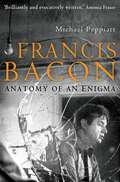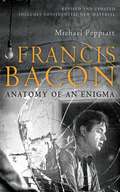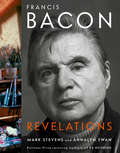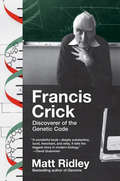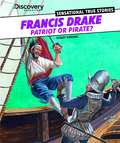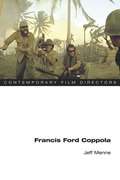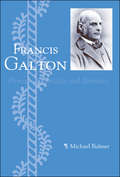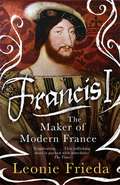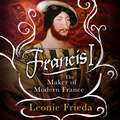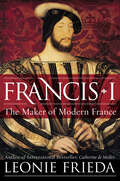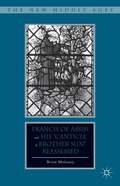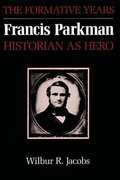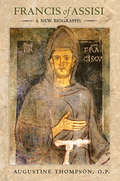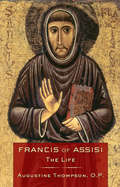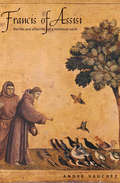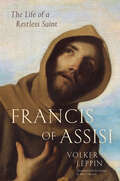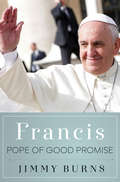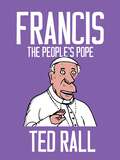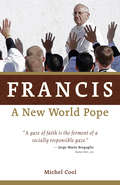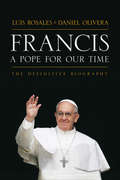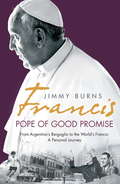- Table View
- List View
Francis Bacon: Anatomy Of An Enigma (Cla.de.ma Ser.)
by Michael PeppiattPublished in 1996, Francis Bacon: Anatomy of an Enigma was the first in-depth study of the artist's life. It has not been superseded.In this substantially revised, updated edition - to coincide with the artist's centenary, which will be celebrated from autumn 2008 through summer 2009 - Peppiatt will incorporate confidential material Bacon gave him, which he did not include in the first edition. This valuable, first-hand information comes from the hundreds of conversations Bacon had with Peppiatt, often late into the night, over thirty years, particularly during the periods Bacon spent living and working in Paris. It includes insights into Bacon's intimate relationships, his artistic convictions and his general view of life, as well as his acerbic comments on his contemporaries.Peppiatt will draw on some of the fascinating information that has become available in the fifteen years since the artist died. Once jealously guarded by the artist himself, the contents of Bacon's studio can now be freely consulted; Peppiatt has had privileged access to these archives, and he will show how a number of recent discoveries - including wholly unexpected source material - have radically changed the way we look at Bacon's work. Similarly, his recent research into the artist's background - his tortured affair with the sadistic Peter Lacy in Tangier, for instance, and the baffling circumstances of his death in Madrid - will shed light on unexplored areas of Bacon's life and work. Peppiatt will also unveil new information from several people who knew Bacon intimately and who have never gone on record previously.
Francis Bacon: Anatomy of an Enigma
by Michael PeppiattPublished in 1996, Francis Bacon: Anatomy of an Enigma was the first in-depth study of the artist's life. It has not been superseded.In this substantially revised, updated edition - to coincide with the artist's centenary, which will be celebrated from autumn 2008 through summer 2009 - Peppiatt will incorporate confidential material Bacon gave him, which he did not include in the first edition. This valuable, first-hand information comes from the hundreds of conversations Bacon had with Peppiatt, often late into the night, over thirty years, particularly during the periods Bacon spent living and working in Paris. It includes insights into Bacon's intimate relationships, his artistic convictions and his general view of life, as well as his acerbic comments on his contemporaries.Peppiatt will draw on some of the fascinating information that has become available in the fifteen years since the artist died. Once jealously guarded by the artist himself, the contents of Bacon's studio can now be freely consulted; Peppiatt has had privileged access to these archives, and he will show how a number of recent discoveries - including wholly unexpected source material - have radically changed the way we look at Bacon's work. Similarly, his recent research into the artist's background - his tortured affair with the sadistic Peter Lacy in Tangier, for instance, and the baffling circumstances of his death in Madrid - will shed light on unexplored areas of Bacon's life and work. Peppiatt will also unveil new information from several people who knew Bacon intimately and who have never gone on record previously.
Francis Bacon: Anatomy of an Enigma (Cla.de.ma Ser.)
by Michael PeppiattFrancis Bacon was one of the most powerful and enigmatic creative geniuses of the twentieth century. Immediately recognizable, his paintings continue to challenge interpretations and provoke controversy. Bacon was also an extraordinary personality. Generous but cruel, forthright yet manipulative, ebullient but in despair: He was the sum of his contradictions. This life, lived at extremes, was filled with achievement and triumph, misfortune and personal tragedy. In his revised and updated edition of an already brilliant biography, Michael Peppiatt has drawn on fresh material that has become available in the sixteen years since the artist's death. Most important, he includes confidential material given to him by Bacon but omitted from the first edition. Francis Bacon derives from the hundreds of occasions Bacon and Peppiatt sat conversing, often late into the night, over many years, and particularly when Bacon was working in Paris. We are also given insight into Bacon's intimate relationships, his artistic convictions and views on life, as well as his often acerbic comments on his contemporaries.
Francis Bacon: Revelations
by Mark Stevens Annalyn SwanA decade in the making: the first comprehensive look at the life and art of Francis Bacon, one of the iconic painters of the twentieth century--from the Pulitzer Prize-winning authors of de Kooning: An American Master. Francis Bacon created an indelible image of mankind in modern times, and played an outsized role in both twentieth century art and life--from his public emergence with his legendary Triptych 1944 (its images "so unrelievedly awful" that people fled the gallery), to his death in Madrid in 1992.Bacon was a witty free spirit and unabashed homosexual at a time when many others remained closeted, and his exploits were as unforgettable as his images. He moved among the worlds of London's Soho and East End, the literary salons of London and Paris, and the homosexual life of Tangier. Through hundreds of interviews, and extensive new research, the authors probe Bacon's childhood in Ireland (he earned his father's lasting disdain because his asthma prevented him from hunting); his increasingly open homosexuality; his early design career--never before explored in detail; the formation of his vision; his early failure as an artist; his uneasy relationship with American abstract art; and his improbable late emergence onto the international stage as one of the great visionaries of the twentieth century. In all, Francis Bacon: Revelations gives us a more complete and nuanced--and more international--portrait than ever before of this singularly private, darkly funny, eruptive man and his equally eruptive, extraordinary art. Bacon was not just an influential artist, he helped remake the twentieth-century figure.
Francis Crick: Discoverer of the Genetic Code
by Matt RidleyFrancis Crick--the quiet genius who led a revolution in biology by discovering, quite literally, the secret of life--will be bracketed with Galileo, Darwin, and Einstein as one of the greatest scientists of all time. In his fascinating biography of the scientific pioneer who uncovered the genetic code--the digital cipher at the heart of heredity that distinguishes living from non-living things--acclaimed bestselling science writer Matt Ridley traces Crick's life from middle-class mediocrity in the English Midlands through a lackluster education and six years designing magnetic mines for the Royal Navy to his leap into biology at the age of thirty-one and its astonishing consequences. In the process, Ridley sheds a brilliant light on the man who forever changed our world and how we understand it.
Francis Drake: Patriot or Pirate? (Discovery Education: Sensational True Stories)
by Robert SheehanFrancis Drake was a man some considered a hero, while others thought he was nothing more than a criminal. Readers will decide for themselves in this fact-filled volume. Easy-to-follow text and colorful illustrations will keep any young readers interest.
Francis Ford Coppola (Contemporary Film Directors)
by Jeff MenneAcclaimed as one of the most influential and innovative American directors, Francis Ford Coppola is also lionized as a maverick auteur at war with Hollywood's power structure and an ardent critic of the postindustrial corporate America it reflects. However, Jeff Menne argues that Coppola exemplifies the new breed of creative corporate person and sees the director's oeuvre as vital for reimagining the corporation in the transformation of Hollywood. Reading auteur theory as the new American business theory, Menne reveals how Coppola's vision of a new kind of company has transformed the worker into a liberated and well-utilized artist, but has also commodified individual creativity at a level unprecedented in corporate history. Coppola negotiated the contradictory roles of shrewd businessman and creative artist by recognizing the two roles are fused in a postindustrial economy. Analyzing films like The Godfather (1970) and the overlooked Tucker: The Man and His Dream (1988) through Coppola's use of opera, Menne illustrates how Coppola developed a defining musical aesthetic while making films that reflected the idea of a corporation as family--and how his studio American Zoetrope came to represent a new brand of auteurism and the model for post-Fordist Hollywood.
Francis Galton: Pioneer of Heredity and Biometry
by Michael BulmerIf not for the work of his half cousin Francis Galton, Charles Darwin's evolutionary theory might have met a somewhat different fate. In particular, with no direct evidence of natural selection and no convincing theory of heredity to explain it, Darwin needed a mathematical explanation of variability and heredity. Galton's work in biometry—the application of statistical methods to the biological sciences—laid the foundations for precisely that. This book offers readers a compelling portrait of Galton as the "father of biometry," tracing the development of his ideas and his accomplishments, and placing them in their scientific context.Though Michael Bulmer introduces readers to the curious facts of Galton's life—as an explorer, as a polymath and member of the Victorian intellectual aristocracy, and as a proponent of eugenics—his chief concern is with Galton's pioneering studies of heredity, in the course of which he invented the statistical tools of regression and correlation. Bulmer describes Galton's early ambitions and experiments—his investigations of problems of evolutionary importance (such as the evolution of gregariousness and the function of sex), and his movement from the development of a physiological theory to a purely statistical theory of heredity, based on the properties of the normal distribution. This work, culminating in the law of ancestral heredity, also put Galton at the heart of the bitter conflict between the "ancestrians" and the "Mendelians" after the rediscovery of Mendelism in 1900. A graceful writer and an expert biometrician, Bulmer details the eventual triumph of biometrical methods in the history of quantitative genetics based on Mendelian principles, which underpins our understanding of evolution today.
Francis I: The Maker of Modern France
by Leonie FriedaFrancis I (1494-1547) was inconstant, amorous, hot-headed and flawed. Arguably he was also the most significant king that France ever had. A contemporary of Henry VIII of England, Francis saw himself as the first Renaissance king. A courageous and heroic warrior, he was also a keen aesthete, an accomplished diplomat and an energetic ruler who turned his country into a force to be reckoned with. Bestselling historian Leonie Frieda's comprehensive and sympathetic account explores the life of the most human of all Renaissance monarchs - and the most enigmatic.
Francis I: The Maker of Modern France
by Leonie FriedaFrancis I (1494-1547) was inconstant, amorous, hot-headed and flawed. Arguably he was also the most significant king that France ever had. A contemporary of Henry VIII of England, Francis saw himself as the first Renaissance king. A courageous and heroic warrior, he was also a keen aesthete, an accomplished diplomat and an energetic ruler who turned his country into a force to be reckoned with. Bestselling historian Leonie Frieda's comprehensive and sympathetic account explores the life of the most human of all Renaissance monarchs - and the most enigmatic.
Francis I: The Maker of Modern France
by Leonie FriedaFrancis I (1494-1547) was inconstant, amorous, hot-headed and flawed. Yet he was also arguably the most significant king that France ever had. This is his story. A contemporary of Henry VIII of England, Francis saw himself as the first Renaissance king, a man who was the exemplar of courtly and civilised behaviour throughout Europe. A courageous and heroic warrior, he was also a keen aesthete, an accomplished diplomat and an energetic ruler who turned his country into a force to be reckoned with. Yet he was also capricious, vain and arrogant, taking hugely unnecessary risks, at least one of which nearly resulted in the end of his kingdom. His great feud with his nemesis Charles V, the Holy Roman Emperor, defined European diplomacy and sovereignty, but his notorious alliance with the great Ottoman ruler Suleiman the Magnificent threatened to destroy everything. With access to never-before-seen private archives, Leonie Frieda's comprehensive and sympathetic account explores the life of the most human of all Renaissance monarchs - and the most enigmatic.Read by Carole Boyd(p) Orion Publishing Group 2018
Francis I: The Maker of Modern France
by Leonie FriedaLeonie Frieda, the bestselling author of Catherine de Medici, returns to sixteenth-century Europe in the evocative and entertaining biography, Francis I.Catherine de Medici’s father-in-law, King Francis of France, was the perfect Renaissance knight, the movement’s exemplar and its Gallic interpreter. An aesthete, diplomat par excellence, and contemporary of Machiavelli, Francis was the founder of modern France, whose sheer force of will and personality molded his kingdom into the first European superpower. Arguably the man who introduced the Renaissance to France, Francis was also the prototype Frenchman—a national identity was modeled on his character. So great was his stamp, that few countries even now are quite so robustly patriotic as is France. Yet as Leonie Frieda reveals, Francis did not always live up to his ideal; a man of grand passions and vision, he was also a flawed husband, father, lover, and king.With access to private archives previously unused in a study of Francis I, Frieda recreates a remarkable era of French history to explore the life of a man who was the most human of the monarchs of the period—and yet, remains the most elusive.“Superb and vivid . . . brings the world of Francis I to life, skillfully delineating the moves and major players in both European and domestic politics . . . and also gives the reader wonderful glimpses of the often licentious court life of that time . . . Frieda suggests that, under Francis I, France preserved its political power, greatly increased its cultural influence, and positioned itself for the Grand Siecle that his Bourbon successors would soon preside over.” —Wall Street Journal
Francis J Browne (1879-1963): A Biography
by Herbert E ReissFrancis James Browne is remembered as the foremost obstetrician of his day. He is widely recognised as the founder of modern antenatal care. His book, Antenatal and Postnatal Care, became the best of its kind and a bible to many generations of medical students and junior obstetricians. FJ (as he was universally known) was born in Ireland, the fourth of eight children of a County Donegal farmer. He qualified in medicine in Scotland in 1906 and worked for 13 years as a general practitioner in a mining town in Wales. At the age of 39, he took up obstetrics and became assistant to JW Ballantyne in Edinburgh. In 1926, he was appointed Professor of Obstetrics and Gynaecology at University College Hospital, London, where he became renowned for his outstanding teaching and inspirational leadership. He was one of the Founding Fellows of the Royal College of Obstetricians and Gynaecologists and was awarded the Blair-Bell Medal for his significant contribution to the specialty in 1960. In this biography, Herbert Reiss presents a fascinating glimpse into the life of a great man in a deft and vivid portrait.
Francis Of Assisi And His "canticle Of Brother Sun" Reassessed
by Brian MoloneyBringing the skills of a literary historian to the subject, Brian Moloney considers the genesis of Saint Francis of Assisi's Canticle of Brother Sun to show how it works as a carefully composed work of art. The study examines the saint's life and times, the structure of the poem, the features of its style, and the range of its possible meanings.
Francis Parkman, Historian as Hero: The Formative Years
by Wilbur R. JacobsA historian who lived the kind of history he wrote, Francis Parkman is a major--and controversial--figure in American historiography. His narrative style, while popular with readers wanting a "good story," has raised many questions with professional historians. Was Parkman writing history or historical fiction? Did he color historical figures with his own heroic self-image? Was his objectivity compromised by his "unbending, conservative, Brahmin" values? These are some of the many issues that Wilbur Jacobs treats in this thought-provoking study. Jacobs carefully considers the "apprenticeship" of Francis Parkman, first spent in facing the rigors of the Oregon Trail and later in struggling to write his histories despite a mysterious, frequently incapacitating illness. He shows how these events allowed Parkman to create a heroic self-image, which impelled his desire for fame as a historian and influenced his treatment of both the "noble" and the "savage" characters of his histories. In addition to assessing the influence of Parkman's development and personality on his histories, Jacobs comments on Parkman's relationship to basic social and cultural issues of the nineteenth century. These include the slavery question, Native American issues, expansion of the suffrage to new groups, including women, and anti-Catholicism. Francis Parkman, Historian as Hero will be important reading for everyone interested in nineteenth-century American culture and the writing of history. A historian who lived the kind of history he wrote, Francis Parkman is a major--and controversial--figure in American historiography. His narrative style, while popular with readers wanting a "good story," has raised many questions with professional historians. Was Parkman writing history or historical fiction? Did he color historical figures with his own heroic self-image? Was his objectivity compromised by his "unbending, conservative, Brahmin" values? These are some of the many issues that Wilbur Jacobs treats in this thought-provoking study. Jacobs carefully considers the "apprenticeship" of Francis Parkman, first spent in facing the rigors of the Oregon Trail and later in struggling to write his histories despite a mysterious, frequently incapacitating illness. He shows how these events allowed Parkman to create a heroic self-image, which impelled his desire for fame as a historian and influenced his treatment of both the "noble" and the "savage" characters of his histories. In addition to assessing the influence of Parkman's development and personality on his histories, Jacobs comments on Parkman's relationship to basic social and cultural issues of the nineteenth century. These include the slavery question, Native American issues, expansion of the suffrage to new groups, including women, and anti-Catholicism.
Francis of Assisi: A New Biography
by Augustine ThompsonAmong the most beloved saints in the Catholic tradition, Francis of Assisi (c. 1181–1226) is popularly remembered for his dedication to poverty, his love of animals and nature, and his desire to follow perfectly the teachings and example of Christ. During his lifetime and after his death, followers collected, for their own purposes, numerous stories, anecdotes, and reports about Francis. As a result, the man himself and his own concerns became lost in legend.In this authoritative and engaging new biography, Augustine Thompson, O.P., sifts through the surviving evidence for the life of Francis using modern historical methods. The result is a complex yet sympathetic portrait of the man and the saint. Francis emerges from this account as very much a typical thirteenth-century Italian layman, but one who, when faced with unexpected crises in his personal life, made decisions so radical that they challenge his own society—and ours. Unlike the saint of legend, this Francis never had a unique divine inspiration to provide him with rules for following the teachings of Jesus. Rather, he spent his life reacting to unexpected challenges, before which he often found himself unprepared and uncertain. The Francis who emerges here is both more complex and more conflicted than that of older biographies. His famed devotion to poverty is found to be more nuanced than expected, perhaps not even his principal spiritual concern. Thompson revisits events small and large in Francis's life, including his troubled relations with his father, his contacts with Clare of Assisi, his encounter with the Muslim sultan, and his receiving the Stigmata, to uncover the man behind the legends and popular images.A tour de force of historical research and biographical writing, Francis of Assisi: A New Biography is divided into two complementary parts—a stand alone biographical narrative and a close, annotated examination of the historical sources about Francis. Taken together, the narrative and the survey of the sources provide a much-needed fresh perspective on this iconic figure. "As I have worked on this biography," Thompson writes, "my respect for Francis and his vision has increased, and I hope that this book will speak to modern people, believers and unbelievers alike, and that the Francis I have come to know will have something to say to them today."
Francis of Assisi: The Life
by Augustine ThompsonThis elegant and accessible biography of one of Catholicism's most beloved saints was originally published as Part 1 of Francis of Assisi: A New Biography by Augustine Thompson, O.P. It stands alone as a richly informed portrait of a man whose complex faith and commitment continue to inspire today. An introduction by Thompson places his biography in the context of continuing discussions about Francis's legacy, particularly the new Pope's decision to adopt the saint's name.
Francis of Assisi: The Life and Afterlife of a Medieval Saint (Medieval Lives Ser.)
by Andre VauchezA biography of the saint as both mystic and man: &“The single best book about Francis now available in English&” (Commonweal). In this towering work, Andre Vauchez draws on the vast body of scholarship on Francis of Assisi, particularly the important research of recent decades, to create a complete and engaging portrait of the saint. He also explores how the memory of Francis was shaped by contemporaries who recollected him in their writings, and completes the book by setting &“il Poverello&” in the context of his time, bringing to light what was new, surprising, and even astonishing in the life and vision of this man. The first part of the book is a fascinating reconstruction of Francis&’s life and work. The second and third parts deal with the texts—hagiographies, chronicles, sermons, personal testimonies, etc.—of writers who recorded aspects of Francis&’s life and movement as they remembered them, and used those remembrances to construct a portrait of Francis relevant to their concerns. Finally, Vauchez explores those aspects of Francis&’s life, personality, and spiritual vision that were unique to him, including his experience of God, his approach to nature, his understanding and use of Scripture, and his impact on culture as well as culture&’s impact on him. &“Considered one of the great spiritual leaders of humankind, Francis of Assisi was also a man of many faces and personas: ascetic, the founder of a religious order, a romantic hero, a mystic, a defender of the poor, a promoter of peace. But as Vauchez emphasizes—and this biography constantly reminds us—Francis was also a flesh-and-blood human being . . . A bracing, erudite account of a mystic&’s life.&” —Booklist
Francis of Assisi: The Life of a Restless Saint
by Volker LeppinAn award-winning historian reconstructs the life of Francis of Assisi, uncovering the man behind the myths One of the most famous figures in Christian history, Francis of Assisi (1181/82–1226) was revered as a miracle worker during his life and quickly canonized after his death. He has inspired generations of Christians and other spiritual seekers, from medieval ascetics to 1960s hippies and modern environmentalists. The &“poverello&” wrote poems praising the sun, moon, and stars, spoke to the birds, and—so the story goes—even tamed a wolf. But what do we know for sure about who he was, and what is simply legend? Drawing on centuries of scholarship, Volker Leppin pieces together fragments of Francis&’s life story to find a seeker who never reached his destination, a man whose extraordinary charisma drew others in yet who was uncomfortable in the spotlight. Amazingly, Francis stayed within the fold of the church while offering a new and radical vision of Christianity that proved wildly popular. Leppin&’s Francis of Assisi sets Francis&’s inner emotional and spiritual world against a broader historical background to show how the message of this inspiring and often vexing medieval saint continues to resonate in our contemporary world.
Francis, Pope of Good Promise
by Jimmy BurnsFrom the moment Pope Francis stepped on to the balcony of St Peter's, people around the globe sensed that not only the Catholic Church, but the world at large, could be entering a new spiritual, political and social age. The pomp and circumstance that had characterised the Vatican for as long as most people could remember evaporated as Francis asked the throng gathered in the square to "pray over" him before he gave his first blessing. Not since John XXIII, had a new Pope opened the windows of the Church so widely to let in some much needed fresh air.This biography of Pope Francis charts Jorge Mario Bergoglio's formation as a priest and bishop against the dramatic backdrop of Argentina's turbulent politics and the challenging principles he adopted as a member of the Jesuit order. It examines critically the extent to which his social conscience was influenced by the legacy of the country's controversial president General Peron and his wife Evita, and questions his moral standing during the Argentina military junta's 'Dirty War' when he was accused of not having done enough on behalf of the victims, including fellow Jesuit priests. Few Vatican elections have generated as much interest as that of Cardinal Jose Bergoglio. Francis, Pope of Good Promise, the first detailed biography to include an analysis of Pope Francis's first year at the Vatican, will appear just as he makes his first visit to the US.
Francis, The People's Pope
by Ted RallCulminating his bestselling series of graphic biographies (Snowden, New York Times Graphic Books Bestseller Bernie, and Trump), Ted Rall's Pope Francis presents the life, ideas, and political impact of the most progressive spiritual leader the world's Roman Catholics have had since Jesus Christ himself. And just in time too! Can a reformer, working within an established, conservative, bureaucratic institution make real change? Usually, radical thinker and political cartoonist Ted Rall would be among the first to shout "hell no." But Rall believes that Pope Francis may be the one notable exception. By expressing sympathy and outrage on behalf of the poor and hungry, solidarity with same sex couples, and righteous anger against the world's banks' use of capital to gain profit at the expense of local communities and on the backs of the middle class, Pope Francis may have already changed the tone and substance of the conversation, Rail believes. As the world's governments persist in ignoring global warming, and exporting war and suffering, Rall considers Pope Francis to be the one world leader who might be able to encourage and inspire a new populism to turn the tide. Raised Roman Catholic himself, Ted Rall is able to bring depth to his latest graphic biography as perhaps no other writer or comics artist could. Rall's art is always attuned to the human comedy, his protagonists funny at the same time as they provide a serious account of some of the most pressing issues and struggles of our times.
Francis, a New World Pope: A New World Pope
by Michel CoolAfter Pope Benedict XVI's historic resignation of the papal office in February 2013, the College of Cardinals elected Jorge Mario Bergoglio, Archbishop of Buenos Aires -- now Pope Francis -- as the new leader of the world's estimated 1.2 billion Roman Catholics.But who is this new Pope -- really?In Francis, a New World Pope, Michel Cool surveys Pope Francis's journey to the papacy, his convictions, his personality, his writings, and the challenges he faces in his new office -- governance of the church, new evangelization in secularized societies, and poverty, among many others.Peppered throughout with anecdotes that demonstrate the humanity of Pope Francis -- and his sensitivity to those who are most distant from the Church -- this book paints a vibrant portrait of the man who has chosen for his motto miserando atque eligendo: "lowly but chosen."
Francis: A Pope for Our Time
by Luis Rosales Daniel OliveraFrancis: A Pope for Our Time, The Definitive Biography incisively chronicles Pope Francis' ancestry, youth, call to faith, humble beginnings with the Society of Jesus, and rise through Argentina's ecclesiastical ranks, all the way to the Vatican. The book emphasizes His Holiness' Jesuit background of humility, poverty, and service that stands to reform the Vatican's long history of lavish excess. The book illustrates Pope Francis' pastoral commitment to society's most underprivileged and disenfranchised.
Francis: From Argentina's Bergoglio to the World's Francis
by Jimmy BurnsFrom the moment Pope Francis stepped on to the balcony of St Peter's Basilica for the first time, a global audience sensed that not only the Catholic Church but the world at large could be entering a new spiritual, political and social age. In the days following Pope Francis' election, there would be further early signs of the simplicity worthy of the first apostles and the leader that inspired them. Not since John XIII appeared on the scene half a century earlier had a new Pope opened the windows of the Church in such a way as to let in some much needed fresh air. Nevertheless, for the excitement generated by the first Latin American Pope and a man who claimed to want to put the poor back at the centre of the Church's social teaching, people could still only guess where it might be all be leading.Francis: Pope of Good Promise is neither an instant media job, nor a hagiography based on authorised interviews, but the product of diligent investigation across a wide range of official and independent sources - a measured, objective portrait of a man who, in circumstances that he neither sought nor foresaw, found himself handed the highest office at a time of crisis not just for the Church but for long established institutions worldwide from banks to political parties.
